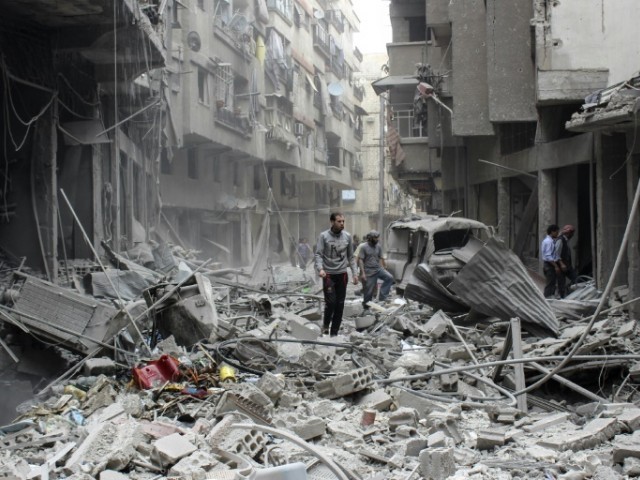www.aljazeerah.info
Opinion Editorials, October 2015
Archives
Mission & Name
Conflict Terminology
Editorials
Gaza Holocaust
Gulf War
Isdood
Islam
News
News Photos
Opinion Editorials
US Foreign Policy (Dr. El-Najjar's Articles)
www.aljazeerah.info
Responding to the Challenge of Russia in Syria
By James Zogby
Al-Jazeerah, CCUN, October 12, 2015
|
|||||
No one should have been surprised that Russia committed its military to the task of saving their ally in Syria from defeat. And no one should now be surprised if Saudi Arabia steps up its support for the Syrian opposition; or if the opposition attacks Russian forces in Syria.
From the very beginning, the tragedy of Syria has been a multi-layered drama. There was the internal conflict with its undercurrents of class and sect tensions. There was also a regional aspect with proxies for Iran and the Arab Gulf States squared off against each other. And then there was the Russia/NATO dimension with Moscow determined not to lose another strategic partner at the hands of the West.
All of this should have been evident from the very start of the conflict, and yet the combatants and their supporters have consistently failed to factor this complexity into their calculations thereby insuring that the war in Syria would grow into the horror it has become.
To recap: drought and failed economic policies by a corrupt state system wreaked havoc on millions of Syrians driving them from their land in search of the means of survival. Their demands for economic justice and greater rights were brutally put down by the government. Repression, mass imprisonment, torture, and the wanton killing of civilians didn't silence the demonstrators; instead it led many to adopt violent means, as well.
The armed opposition to the regime was never a simple phenomenon. There were elements who left the Syrian Army and turned against the regime they had once served. There were groups, some motivated by religious beliefs seeking to impose their ideology on the state while others simply sought revenge for the brutal excesses of the regime. There were even armed gangs of smugglers who simply took advantage of the opportunity created by the growing conflict.
There were also unarmed oppositionists, some who were organizing outside of the country, and others who worked, under great duress, in an effort to promote change inside Syria.
Arrayed against all of these forces was a regime with its political, military, and security apparatus—all of which were well- practiced in the use of violence and political repression. If this were the whole story of Syria, the drama might have played out very differently. But there was more.
First there were millions of Syrians who, when push came to shove, proved to be more afraid of the opposition than they were of the regime. They were a mix of religious minorities, secular urban elites, and others who were just trying to live their lives. Many had experienced repression at the hands of the state, but they dreaded the disruption of daily life they saw accompanying the civil war and they recoiled in the face of the ideologies espoused by elements of the armed opposition.
The fact that both the state and the opposition had real bases of support should have given everyone pause. It established, early on, that unless there was pressure on all sides to negotiate a compromise solution, this conflict would not end easily or quickly.
But there was still more. With their ally threatened, Iran stepped in to offer support. Some Arab Gulf States still reeling from Iran's recently secured foothold in Iraq and Islamic Republic's meddlesome involvement in other parts of the region, simultaneously increased their support for both the armed and unarmed opposition. Each step taken by one side was matched by the other.
In reaction to the mounting death toll and reports of horrifying atrocities, the US hesitantly entered the fray, publicly offering non-lethal support to the opposition while covertly providing training and arms, as well. As the conflict worsened and the brutality of the regime intensified, the US increased its political posture stating that the regime had "lost its legitimacy" and that its leader "must go". This served to embolden the opposition justifying their rejection of any form of compromise with the regime, while at the same time hardening the Russian position. Russia had seen the US having its way with Serbia, Iraq, and Libya, and was not about to surrender its strategic asset in Syria. Early efforts by the US and Russia to create a framework that might have led to negotiations stalemated.
All of these layers and rivalries are present in Syria. And yet players in the conflict ignore them with devastatingly deadly consequences. They act as if the conflict were simple mathematics, and not the complex calculus that it is; as if the actions they take will stand alone and not impact and cause reactions on all the other layers of the conflict.
Because all of the parties on each layer have their interests to protect, they feel that defeat is not an option. What this should have led to is the recognition that this is a conflict that no one will win and everyone will lose. The tragedy is that this has not yet taken hold and so everyone keeps pouring more gasoline on the fire only to be shocked when it burns more brightly.
Politicians who are now calling for a more forceful US military response are, in effect, asking that we too join the bucket-brigade of gasoline pourers. This is clearly not smart since it will only exacerbate an already intolerable situation for Syrians and for the region. What we ought to do, instead, is design a strategy utilizing all of the diplomatic and economic levers that are available to us and our NATO and Arab allies to pressure the Russians and the Iranians back to the Geneva negotiating process.
***
Share this article with your facebook friends
|
|
|
|
||
|
||||||






